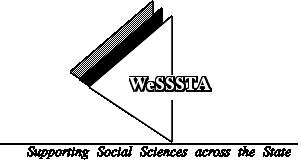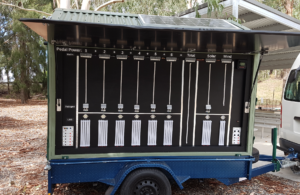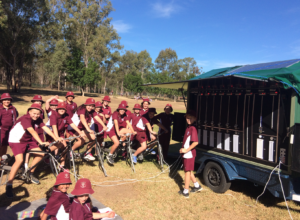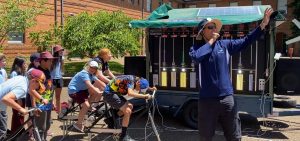Incursions
Primary Incursion – Towards a Sustainable Penrith Lakes
How the incursion works:
Staff from PLEEC will arrive at your school before your ‘recess’ break to set up and observe your school’s protocols for incursions. They will deliver 2x 1 hour sessions introducing Penrith Lakes and displaying water bugs founds at Penrith Lakes. At your ‘lunch’ break PLEEC staff will pack up and return to the Education Centre.
The incursion touches on syllabus outcomes for :
- Science – Living world, 4LW-S, and explains can how students may work scientifically.
- Geography – Local area , GE-1 and GE-2, Features of Places, Places are Different and Factors that Shape Places
Activities:
• Introduction to the Penrith Lakes Parkland – Where is it? Why is it there? What is it like there?
• Relationships between humans and the natural environment. A look at macro-invertebrate water bugs and what they mean for sustainability.
(Water bugs and viewing equipment provided by PLEEC.)
Please click to view more details and risk assessment.
To book please fill in a booking form under the Make a booking tab above.
Primary Stage 2 & 3 – Factors that Shape Environments at Penrith Lakes
How the incursion works:
Staff from PLEEC will arrive at your school before your ‘recess’ break to set up and observe your school’s protocols for incursions. PLEEC staff will deliver a 80 – 90 minute program between recess and lunch. At your ‘lunch’ break PLEEC staff will pack up and return to PLEEC.
The incursion touches on syllabus outcomes for :
1. Geography -, GE2 -1, 2 & 4 (The Earth’s Environment) and GE3 – 1, 2 & 4 (Factors that Shape Places).
2. Science – Living world, 4LW-S, and explains can how students may work scientifically.
Activities:
• Introduction to Penrith Lakes and water birds.
• Measuring environmental impacts at Penrith Lakes
* Water Testing. All testing equipment & water samples are provided by PLEEC staff.
* Water bird classification and importance.
* Waterbug analysis.
(Water bugs and viewing equipment provided by PLEEC staff.)
Please click to view more details and risk assessment.
To book please fill in a booking form under the Make a booking tab above.
Secondary Stage 4 Science Incursion – Living Lakes
How the incursion works:
Staff from PLEEC will come to your school and deliver 2 – 90 minute sessions for up to 60 Students between recess and lunch at your school.
(Multiple days can be booked for larger cohorts-maximum 15km from centre)
Activities:
- Water Testing. All testing equipment & water samples are provided by PLEEC staff.
- Waterbug analysis. Water bugs and viewing equipment provided by PLEEC staff.
- Food webs and trophic levels activity.
The incursion touches on syllabus outcomes for :
The Living Lakes incursion addresses Stage 4 Science syllabus outcomes :
LW1 – There are differences within and between groups of organisms; classification helps organise this diversity. (ACSSU111)
LW5 – Science and technology contribute to finding solutions to conserving and managing sustainable ecosystems. (ACSSU112)
Working Scientifically Skills:
SC4-6WS – follows a sequence of instructions to safely undertake a range of investigation types, collaboratively and individually.
SC4-7WS – processes and analyses data from a first-hand investigation and secondary sources to identify trends, patterns and relationships, and draw conclusions.
Please click to view more details and risk assessment.
To book please fill in a booking form under the Make a booking tab above.
Renewable Energy Education Trailer Incursion | Stage 3-5 | Science
This excursion addresses outcomes from the NESA Stage 3-5 Science Syllabus.
Focus – ‘Physical World’
This new program has been created to cater for all students from Stage 3 -Stage 5.
Sustainability is complex and requires interdisciplinary knowledge and skills – Maths, Science, Geography etc, in order for students to truly become 21st Century citizens – capable of change!
This unique and highly engaging program allows students to learn about energy and perform a first-hand investigation using various equipment and data collection methods to critically analyse the different energy generation methods and their impacts.
Students are guaranteed to be involved in a number of engaging and hands on experiences during the course of the day. Through these students will further develop their knowledge and understanding, group work and working scientifically skills.
Click here to view program, worksheet and risk assessment.








